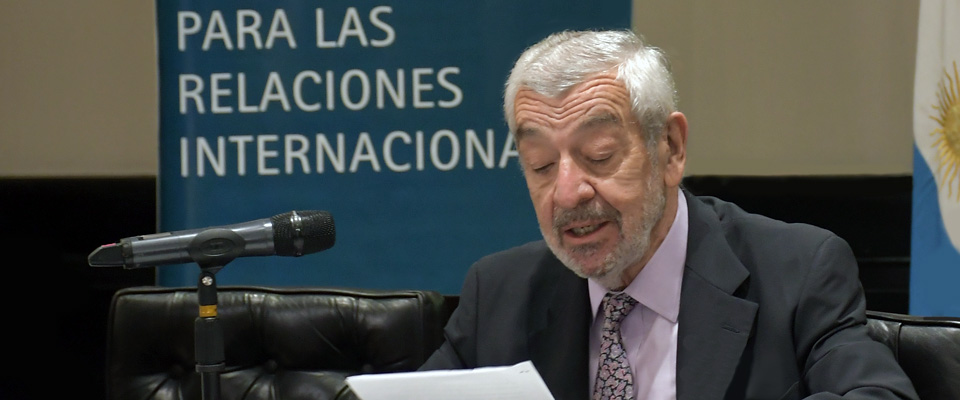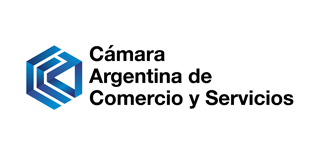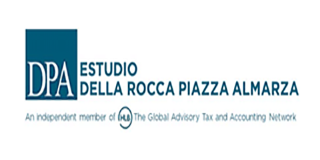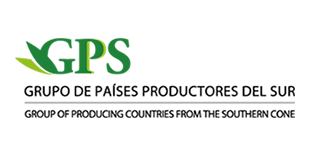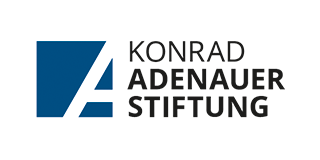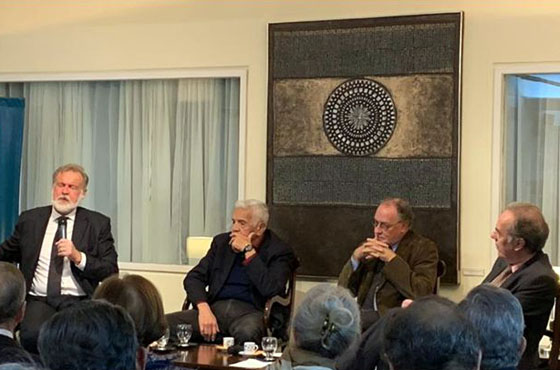
April 25, 2019
A round-table debate with Rafael Bielsa, Marcelo Cantelmi and Jorge Castro. Moderator: Eduardo Sadous
Written by Chloé Mauvais
We are facing a global crisis of values
On the 25th of April 2019 a debate on the state of values in the international order opened at the Argentine Council for International Relations. This debate was part of the series of conferences titled "The world to come and how Argentina can insert itself", organized by CARI’s Cultural Affairs Committee with the support of the UNESCO and Ortega y Gasset Foundation.
Ambassador Eduardo Sadous, the moderator of the debate and director of CARI’s Committee of Asian Affairs, opened the session by introducing Dr. Jorge Castro to the audience. Dr. Castro, president of the Institute of Strategic Planning, laid out a two-pronged diagnosis of values in the current world order. First, he highlighted the fact that the agreement that came to fruition during the Buenos Aires G20 Summit between Donald Trump and Xi Jinping established a permanent mechanism of cooperation between their respective superpowers. The agreement focused on the topic of security, although the true core of the document was the topic of commercial relations between the US and China. Combined, the two countries are responsible for 50% of the global GDP. In other words, Castro argued, "this agreement is the central event of our time". It constitutes one of the few points of certainty in a global context marked by heavy fluctuations.
Although the agreement between the US and China offsets some of the confusion inherent to our day and age, uncertainty persists. Castro affirmed that such uncertainty, endemic to the international system and resulting from a rapidly expanding global economy, signals the development of the fourth industrial revolution in the history of capitalism. The revolution consists of "the complete digitalization of manufacturing and services", Castro explained. "This already an ongoing process, but it is now accelerating". However, "with the agreement between Donald Trump and Xi Jinping, there is a factor of fundamental certainty in this moment of uncertainty".
Dr. Castro moved to the second core remark of his presentation: both the exceptional and unstable growth of the world’s biggest economies and the new technical revolution all contribute to a current crisis of global values. The triumph of instrumental reason—the praxis of logic employed to achieve the best or most efficient means to an end—as the nucleus of the powerful capitalist system contributes to that crisis. The central problem of instrumental reason is that although it can explain the "how" of things, it lacks the answers for the "why". "Why grow?" Castro asked. "Why live? What is the meaning of life, what is the meaning of things?"
Instrumental reason leaves the goals and values of the global system shrouded in mystery, leading directly to a crisis of values. "It’s a spiritual wasteland", Castro affirmed. He concluded his remarks with a tribute to Pope Francis, who he praised as the motor of the fight to reorient the values at the core of the new global society.
Marcelo Cantelmi, head of International Politics at the newspaper Clarín, followed Castro’s remarks with the argument that the world is currently in a situation of figurative war. He cited Angela Merkel to state his belief that the world system is in decline. Cantelmi argued the key factors accelerating that decline are weakness and decay among prominent political leaders. "We miss political figures that were a bit more profound", he said.
The phenomenon of these trade tensions (…) is causing misfortune in the world periphery
Cantelmi mentioned Brexit as the principal illustration of that point, given that it demonstrates just how much the global system has deformed itself since the turn of the century. He noted, however, that such deformation began in earnest with the explosion of the global economy in 2008. Cantelmi argued the crisis transformed the parameters that define our lives; most important, it advanced China at the expense of the United States and Europe, generating an abyss that left many individuals frustrated and outside the system. That frustration manifested as the anti-system extremism that emerged on both the far right and the extreme nationalist fronts.
Cantelmi pointed to Brexit, on top of the ongoing conflict between the United States and China, as the cause of a stall in global economic growth, which began in 2016. Cantelmi affirmed that "the phenomenon of those commercial tensions doesn’t just stall the circuit of the global economy: it’s producing a supplement of bad luck for the global periphery". He illustrated that point with such problems as monetary crises and the emergence of populism.
Cantelmi suggested that most of the uncertainty in current politics stems from how little people know of the North American strategy. On one hand, the United States seems focused on alleviating the global crisis in order to avoid its impact on domestic politics, but on the other hand it has aligned itself against Europe in commercial matters. Europe should be Washington’s principal ally in the conflict against China, he argued. This disorder, according to Cantelmi, "makes one think about the similarities with other unfortunate times, most of all the period between the two world wars".
Rafael Bielsa, the honorary Academic Director of the Argentine Center for Judicial Studies and ex-Minister of External Relations for Argentina, followed Cantelmi’s remarks with a note on what he called the continuities of the West’s evolution. He focused on the West, but noted that the world has globalized to such an extent that the ties between countries have become inextricable. Moore’s Law, which states that the number of transistors in a dense integrated circuit doubles every two years, is one among those continuities. Taken broadly, the law posits that technology will evolve at breakneck speed. He noted that the rate of change, which is only increasing, forces people to make an extraordinary effort in order to keep up with the generation of information and knowledge. "I think that the scarcity of leadership", has a lot to do with the fact that "it is impossible to carry out an executive function and simultaneously keep oneself informed, if not educated".
According to Dr. Bielsa, the speed of those changes not only affects global leaders: it also disturbs other spheres, reaching all of the individuals with "a deep ethical implication". In order to illustrate these consequences, Bielsa noted how the manipulation of the human genome triggered a debate on values within the scientific community, specifically concerning when an embryo can or should be discarded. In further illustrating the dilemmas surrounding the medical community, which he said would only worsen in terms of ethical and moral implications, he pointed to the economic inaccessibility of a double knee transplant. How many people can afford a $250,000 operation like that one, he asked? Very few, he explained, and "it will generate an extraordinary social tension between those who can do it—who are very few—and those who cannot—who are the majority".
There is perplexity, anger, disappointment and ultimately demoralization
Bielsa also pointed to the role of big data in the internal dispute over Brexit, noting that it contributed to attacks against democracy. For Bielsa, "these problems will continue to appear at an ever-increasing scale".
Bielsa, like Cantelmi, pointed to the 2008 economic crisis as a point of rupture in which financial appropriation triumphed over productive appropriation. This shift underlined the victory of Wall Street over Main Street. "This cannot last", Bielsa cautioned. He pointed to the unsustainable nature of fiat money as well as the banking system, altogether arguing that the system is nearing a breaking point.
In a society in which the new morality encourages conservative populist leadership with a "heavy religious charge", there will be "perplexity, anger, disappointment, and, finally, demoralization". These new kinds of nationalism could entail a breakage in the continuity of rights enshrined in liberal constitutions. "We will be living in turbulent times", Bielsa concluded.
Eduardo SadousIs the ex Ambassador to Venezuela. He is also the ex-Sub-secretary of International Economic Negotiations at the Ministry of External Relations and Religions. He is President of the Ceremonial Argentine Academy, President of the Argentine Academy of Áfrican and Asian Studies, and President of the Argentine branch of the International Law Association. He is currently acting as director of the Committee on Asian Affairs at CARI. He is professor emeritus at the University of Belgrano, the University of El Salvador, the National University of La Plata, and the National University of Luján
Jorge CastroIs an international analyst and a lawyer. He is the ex-Secretary of Strategic Planning, ex-director of the International Politics section of the Tiempo Argentino newspaper. He also acted as adjunct director of El Cronista Comercial, as well as columnist in La Nueva Provincia of Bahía Blanca. He has taught as a professor at various universities for over twenty years. He is now a columnist for Clarín, La Nación and Perfil. He is the founding associate of the American Thought Foundation. He is also the author of several books
Rafael BielsaIs a lawyer, politician, writer and poet. He is an expert in the institutional strengthening of justice at the United Nations, as well as the honorary Academic Director of the Center for Judicial Studies of the Argentine Republic. Bielsa is a General Trustee of the Nation. He founded the Government, State, Society, All Now Foundation (GESTA). He is also ex-Minister of External Affairs. Currently, Bielsa acts as a National Deputy in the Chamber of Deputies
Marcelo CantelmiIs the Director of International Politics the head analyst of international affairs at the newspaper Clarín and professor in the Department of Social Sciences at the University of Palermo. He is the director of the Observatory of International Politics, a project in development at the University of Palermo
